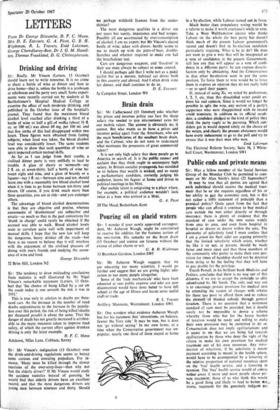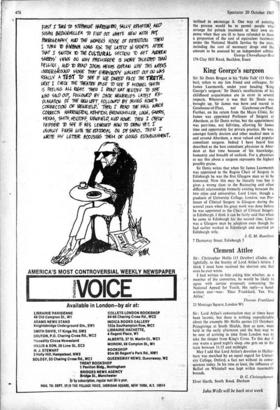Public ends and private means
Sir: May a fellow member of the Social Services Group of the Monday Club be permitted to com- ment on Mr Alan Smith's letter (22 September)?
It may be true that all parties are agreed that each individual should receive the medical trait- meat that he or she requires regardless of his or her ability to pay the economic cost, but is this not rather a lofty statement of principle than a praotical policy? Quite apart from the fact that people Who can afford it continue to buy medical care outside the NHS either directly or through insurance, there is plenty of evidence that the standard of care under the NHS varies widely from area to area, and even from hospital to hospital or doctor to doctor within the area. The advocates of selectivity (and I must confess that I am a priori on their side) are arguing primarily - that the limited selectivity which exists, whether we like it or not, at present, should be made fairer and more open and that those members of the community who prefer to make their own pro- vision for times of hardship should not be deterred from doing so by the feeling that they will have to pay double for the privilege.
Enoch Powell. in his brilliant book Medicine and Politics, concludes that there is no way out of this dilemma if we are to accept the principle so ably adumbrated by Mr Smith. The only real way out is to encourage private provision for medical care by extending the system of charges with rebates for those too poor to afford them and so reduce the element of blanket subsidy through general taxation. There is no question that a minimum standard of care must be provided; but it should surely not be impossible to devise a scheme whereby those who but for the heavy burden of taxation would be ready and willing to make their own provision may be permitted to do so. Conservatism does not imply egalitarianism; and it seems to me that we are being led towards egalitarianism by those who deny the right of the citizen to make his own provision for medical treatment out of his own resources. Any intro- duction of selectivity, if by selectivity is meant payment according to means in the health sphere. would have to be accompanied by a lowering of the relative proportion of national resources spent on the 'free' health service, and a lowering in taxation. The 'free' health service would of course wither away if more and more people chose pri- vate treatment; those of us who think this would be a good thing and likely to lead to better. not. worse, treatment for the genuinely indigent arc inclined to encourage it. One way of assisting the process would be to permit people who arrange for private treatment at their own ex- pense when they are ill to have refunded to them a proportion of the cost of equivalent treatment under the National Health SerVice by the state, including the cost of necessary drugs and the amount to be assessed by an independent arbiter.



































 Previous page
Previous page